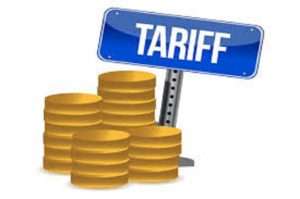The Volokh Conspiracy
Mostly law professors | Sometimes contrarian | Often libertarian | Always independent
Bipartisan Group of Prominent Legal Scholars and Former Government Officials Files Amicus Brief Supporting Our Case Challenging Trump's "Liberation Day" Tariffs
Signers include Steve Calabresi, Harold Koh, Richard Epstein, Michael McConnell, Alan Sykes, former Attorney General Michael Mukasey, and others.

A bipartisan group of prominent legal scholars and former government officials have filed an amicus brief supporting the lawsuit against Donald Trump's "Liberation Day" tariffs, recently filed by the Liberty Justice Center and myself, on behalf of five US businesses severely harmed by the policy.
The brief unites big-name constitutional law scholars across the political spectrum in a way I have rarely seen. Legal scholars on the brief include Steve Calabresi (Northwestern), Harold Koh (Yale), Richard Epstein (NYU), Michael McConnell (Stanford, also former federal judge), Alan Sykes (Stanford), and Gerard Magliocca (Univ. of Indiana).
Steve Calabresi is a famed conservative constitutional law scholar and co-founder of the Federalist Society. Michael McConnell is also one of nation's leading conservative/originalist constitutional law scholars, and Richard Epstein is probably the world's leading libertarian legal scholar. Calabresi literally (with Christopher Yoo) wrote the book on unitary executive theory. If he says an assertion of executive power exceeds constitutional bounds, it almost certainly does! McConnell is also a leading expert on executive power.
Koh, Sykes, and Magliocca are leading progressive scholars. Koh is one of the nation's leading experts on the constitutional law of foreign affairs, and Sykes on international economic and trade law. Magliocca is a prominent writer on constitutional history.
Former government officials joining the brief include former Attorney General Michael Mukasey, former Virginia Governor and Senator George Allen, former Senator and Secretary of Defense Charles Hagel, and more.
I never would have expected to see Richard Epstein, Steve Calabresi, and Harold Koh all on the same brief on a major issue. But here they are, together opposing "taxation by proclamation." Donald Trump brought them together. He alone could do it!
Many thanks to Josh Claybourn and Gerard Magliocca for their work bringing this group together.
Here is an excerpt from the brief's summary of argument:
What unites these amici is a shared conviction that process matters—that how we govern is as vital as what we decide. The powers to tax, to regulate commerce, and to shape the nation's economic course must remain with Congress. They cannot drift silently into the hands of the President through inertia, inattention, or creative readings of statutes never meant to grant such authority. That conviction is not partisan. It is constitutional. And it strikes at the heart of this case.
This dispute is not about the wisdom of tariffs or the politics of trade. It is about who holds the power to tax the American people. May a President, absent a clear delegation from Congress and without guidance that amounts to an intelligible principle, unilaterally impose sweeping tariffs under laws never designed for that purpose? This is not a debate over outcomes but a test of structure. It asks not what should happen, but who decides.
The Constitution gives a clear answer. Article I vests Congress—not the President—with the power to "lay and collect Taxes, Duties, Imposts and Excises," and to "regulate Commerce with foreign Nations." Unless Congress has delegated that authority through a valid and clearly bounded framework, the President may not impose tariffs….
In April 2025, President Trump proclaimed a sweeping tariff regime that touches nearly every imported good sold in the United States…. These levies did not arise from legislation. They were not the product of congressional debate or any statutory process. Nor were they supported by specific findings under existing trade laws. Instead, they were imposed unilaterally, by presidential proclamation….
But no statute authorizes what the President has done. The laws cited permit limited and targeted actions under narrow conditions. They do not authorize sweeping economic realignment. They do not permit unilateral taxation of vast sectors of the U.S. economy. These duties came not from Congress, but from a claim of executive power detached from constitutional limits….
IEEPA, the central statute invoked, cannot bear this weight. Enacted in 1977 to rein in presidential overreach, IEEPA allows the President to impose sanctions in response to genuine emergencies—not to reorder the economy in response to long-term trends. Its legislative history is clear: Congress never intended it as a backdoor for permanent tax policy, nor as a means of sidestepping Article I.
The core principle urged by amici is this: IEEPA and related statutes do not grant the President the power to impose tariffs of this kind or scope. That power remains squarely within the legislative domain. The Constitution places decisions about taxation and commerce in Congress's hands—not as a formality, but as a structural safeguard of democratic accountability….
This case requests this Court apply the principles which have been reaffirmed time and again: that Congress makes the law, and the Executive enforces it; that major policies require explicit legislation; and that the Constitution does not permit taxation by proclamation. These principles are neither new nor partisan. They are the foundation of the American republic.
The stakes here are immediate and profound—not because of any particular trade policy, but because of the process by which that policy was imposed. For decades, the United States has anchored a global trading system built on transparency, deliberation, and the rule of law. That stability is jeopardized when core powers—like the power to tax—are exercised unilaterally, without congressional input, statutory grounding, or public explanation. The President's tariff proclamations bypass the constitutional framework that lends legitimacy and predictability to American lawmaking. Already, foreign governments are reexamining their trade commitments in response. If courts permit this path to stand unreviewed, it will invite escalating disruption—not just to international commerce, but to the very norms that sustain constitutional governance. The Court's intervention is not merely appropriate; it is essential to reaffirm that in a republic, process cannot be subordinated to expediency.


Show Comments (7)